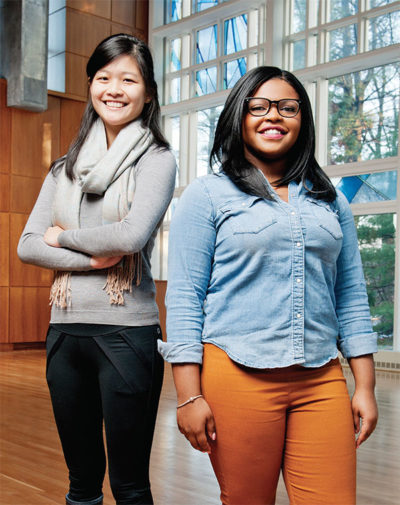For three days every January, Babson Posse Scholars and their invited guests travel to the woods of New Hampshire. There, in a quiet setting far removed from the bustle of campus, they launch into conversations that are honest, personal, and far from the usual chitchat.

Photo: Webb Chappell
Posse Scholars Rachel Wong ’17 (left) and Tiara Zain ’17
Called the PossePlus Retreat, the gathering allows attendees to speak frankly about issues that loom large on campus and in the nation. Every year brings a new subject. This January’s topic, “Us vs. Them: Identity and Polarization in American Society,” looked at the many divisions that mark life in the U.S. today: black vs. white, Republican vs. Democrat, police vs. protestor, American vs. foreigner. Past retreats have tackled other complex issues, including gender and sexuality, language and labels, the criminal justice system, civic engagement, and class, power, and privilege.
“It gets intense,” says Melissa Shaak, Babson’s director of student financial services. Shaak serves as the College’s liaison with the Posse Foundation, which organizes retreats for all of its partner schools across the country. “People are encouraged to get uncomfortable, to get out of their comfort zone. There are always hugely poignant moments.”
Retreats take place at a remote camp and conference center in the small town of Greenfield. Attendees stay in heated cabins and a lodge, and discussions are held in a large meeting room overlooking frozen Otter Lake. “It’s rustic,” says Tiara Zain ’17, Posse Scholar. “I’m from New York, where everything is fast. This is in the woods. It’s very serene.”
Attendees arrive on a Friday. They may be shy about participating at first, given that the retreat’s topics often aren’t easy to discuss. “Some people are scared to share at the beginning,” says Rachel Wong ’17, Posse Scholar. “But after a day, people start to open up. The mood changes. People become more comfortable with each other.”
Facilitators from the Posse Foundation lead the discussions. They work hard to create an open and safe atmosphere. Differing viewpoints are encouraged, and fun activities are held to break up the serious conversations. Attendees also trust that their private opinions and stories won’t be shared back on campus. In short, what is said in New Hampshire, stays in New Hampshire. “It’s OK to open up,” Wong says. “The idea is to hear about other people’s ideas. You’re really trying to have a conversation.”
Zain appreciates how the retreat makes attendees examine important issues more closely. When the topic one year was “Crime and Punishment,” for example, she recalls how some in attendance talked about the difficult interactions they’ve had with police in New York City. “You get a whole new outlook not just from the news,” she says. “You’re hearing from people who are actually dealing with it.” Zain also enjoys how well she gets to know the other retreat participants, learning about their backgrounds and the challenges they face in their lives. Those revelations often force her to confront assumptions she may have made about them. “It’s deeper than school small talk,” she says. “You find out things about people you didn’t know. It’s like getting to know someone on steroids. You see people in a new light.”
About 100 people attend the event. Babson has 40 Posse Scholars, 10 for each class, and they each bring one student guest to the retreat. Those in Posse think long about whom to invite, and they don’t necessarily pick their closest friends. “It can be hard to decide who you want to bring,” Wong says. “Some people might bring someone who is really shy because they want to help them open up. Other Posse Scholars are seeking out people who have different views.”
Additionally, each Posse class invites three staff or faculty members. “It’s people they value,” says Shaak, who in her role as Posse liaison has been to 13 retreats through the years. “It’s a huge honor to be invited.” Reynolds fixture Woody Lappen was invited one year, and public safety officer Robert Gilman was invited for the retreat focused on “Crime and Punishment.” “They asked him a thousand questions,” Shaak says.
By inviting others to the retreat, Posse Scholars hope to have a wide campus impact, one that extends beyond just a weekend, Shaak says. That is part of the mission of Posse, which serves not only as a support system for students but also as a leadership organization (students’ leadership abilities are the main criteria by which they are chosen to participate in Posse). Boarding the bus on Sunday at the retreat’s end, attendees bring all they’ve learned back to campus, where hopefully discussions will continue. “We have these retreats as a starting point,” says Wong, “not an endpoint.”—John Crawford
